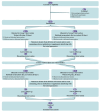Benefits of Short-Term (4-Week) Daily Walnut Consumption in Middle-Aged Adults at Risk for Metabolic Syndrome: Outcomes of a Randomized Controlled Trial
- PMID: 40647178
- PMCID: PMC12250811
- DOI: 10.3390/nu17132072
Benefits of Short-Term (4-Week) Daily Walnut Consumption in Middle-Aged Adults at Risk for Metabolic Syndrome: Outcomes of a Randomized Controlled Trial
Abstract
Background: Epidemiological research has shown that regular walnut (from Juglans regia L.) consumption is associated with a reduced risk of cardiovascular disease (CVD), potentially attributable to their antioxidant and anti-inflammatory properties. The vascular cellular adhesion molecule-1 (VCAM-1), a protein upregulated in CVD, has been previously examined in relation to walnut consumption. However, the clinical findings regarding the effects of walnuts on endothelial function among middle-aged individuals susceptible to metabolic syndrome (MetS) remain inconclusive. Objective: This study examined the effects of daily walnut consumption over a four-week period on cardiometabolic parameters (lipid and glycemic profiles, as well as soluble VCAM-1 levels) and anthropometric measurements in middle-aged individuals with at least one altered MetS parameter and no medication. Methods: In a randomized controlled cross-over trial, 22 eligible Caucasian participants (48.81 ± 4.3 years) were selected and randomly assigned to receive either 45 g of walnuts per day or no walnuts within a controlled diet. There were two 28-day intervention periods, with a one-month washout period in between. Clinical and biochemical evaluations were conducted at the beginning and end of each intervention period. Results: A total of 20 participants completed the intervention and were analyzed, with walnuts being well tolerated. A significant decrease in waist circumference (p = 0.049) and a slight change in fasting blood glucose (p = 0.089) were noted following walnut intake. Conclusions: Short-term (4 weeks) dietary supplementation with walnuts resulted in a statistically significant reduction in waist circumference while not impacting the overall health status of participants. Longer-term studies are necessary to investigate the benefits of daily walnut consumption and its impact on the onset and development of MetS in this age group.
Keywords: Juglans regia; blood pressure; cholesterol; chronic inflammation; dyslipidemia; endothelial function; fasting blood glucose; glycemia; glycemic profile; hypertension; lipid profile; triglycerides; waist circumference.
Conflict of interest statement
The authors declare no conflicts of interest.
Figures
Similar articles
-
Dietary Approaches to Stop Hypertension (DASH) for the primary and secondary prevention of cardiovascular diseases.Cochrane Database Syst Rev. 2025 May 6;5(5):CD013729. doi: 10.1002/14651858.CD013729.pub2. Cochrane Database Syst Rev. 2025. PMID: 40326569 Review.
-
Impact of walnut consumption on cardio metabolic and anthropometric parameters in metabolic syndrome patients: GRADE-assessed systematic review and dose-response meta-analysis of data from randomized controlled trials.Pharmacol Res. 2022 Apr;178:106190. doi: 10.1016/j.phrs.2022.106190. Epub 2022 Mar 23. Pharmacol Res. 2022. PMID: 35338001
-
Nutritional interventions for survivors of childhood cancer.Cochrane Database Syst Rev. 2016 Aug 22;2016(8):CD009678. doi: 10.1002/14651858.CD009678.pub2. Cochrane Database Syst Rev. 2016. PMID: 27545902 Free PMC article.
-
The Effect of Walnut Intake on Lipids: A Systematic Review and Meta-Analysis of Randomized Controlled Trials.Nutrients. 2022 Oct 23;14(21):4460. doi: 10.3390/nu14214460. Nutrients. 2022. PMID: 36364723 Free PMC article.
-
Systemic pharmacological treatments for chronic plaque psoriasis: a network meta-analysis.Cochrane Database Syst Rev. 2021 Apr 19;4(4):CD011535. doi: 10.1002/14651858.CD011535.pub4. Cochrane Database Syst Rev. 2021. Update in: Cochrane Database Syst Rev. 2022 May 23;5:CD011535. doi: 10.1002/14651858.CD011535.pub5. PMID: 33871055 Free PMC article. Updated.
References
-
- Ambroselli D., Masciulli F., Romano E., Catanzaro G., Besharat Z.M., Massari M.C., Ferretti E., Migliaccio S., Izzo L., Ritieni A., et al. New Advances in Metabolic Syndrome, from Prevention to Treatment: The Role of Diet and Food. Nutrients. 2023;15:640. doi: 10.3390/nu15030640. - DOI - PMC - PubMed
-
- Mozaffarian D., Benjamin E.J., Go A.S., Arnett D.K., Blaha M.J., Cushman M., Das S.R., De Ferranti S., Després J.-P., Fullerton H.J., et al. Heart Disease and Stroke Statistics-2016 Update A Report from the American Heart Association. Circulation. 2015;133:38–360. doi: 10.1161/CIR.0000000000000350. - DOI - PubMed
-
- Zhu Y., Bing J., Zheng L., Hao P., Teng X., Wan L. The Association between Composite Dietary Antioxidant Index and the Metabolic Syndrome: NHANES 2007–2018. J. Funct. Foods. 2024;116:106200. doi: 10.1016/j.jff.2024.106200. - DOI
Publication types
MeSH terms
Substances
Grants and funding
LinkOut - more resources
Full Text Sources
Medical
Miscellaneous


